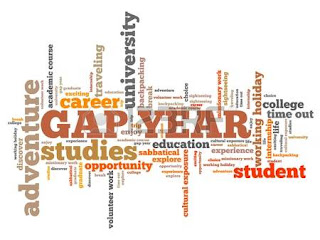Taking A Gap Year Before College
The Gap Year
Although, it is closer to the truth to say that entering college immediately after graduation from high school is the unanimous choice nowadays. Inspite of the complete fusion of the "cradle-to college" mindset deeply rooted in parents and the ravenous appetite of a school leaver for same, many factors stands to delineate the underlying motive and concern of this insistence.
It is far from fact and reasonable arguement that the course to study and the institution to attend are the most important either in the conscious mind of most school leavers or of that which appeal to us in nature. It is an a priori that the practical concern of many is just the certificate and the experience of what being in college entails. Instead of running the supersonic race to college with other humans,why not take a year to discover new life skills?
Rational beings are those like us,whose thoughts and conducts are guided by reasons,then there seems to be a puzzling question as to what in a mental or sensory composition could accept such a gapping idea? However, this question would receive it most important modern exposition when viewed and perceived as a bridge year to discover and develop an hidden passion which could create from scratch, a strategic blueprint for achieving future objectives. It is then in pondering such consideration that one comes to realize how deeply embedded in human race is this dogma and how immediate it pose an urgent quest for a critical scrutiny.
For parents whom this approach leaves anxious and uncertain and for those who have criticized it as creating too great an unnecessary gap in one's academic line,it is doubtful whether there is any universal principle governing this,but clearly,these ideas and such closely connected with it crumbles and fails to take account of the fact that running a breathless race to college is not one of priority. For what reason would the enormous amount of human energy invested in securing such quick a space in college begins to seems rather pointless having to spend years after college gathering experiences?
Unlike gapers,who may be better able to get a job with their diverse real-world experiences, on their resume,they look shiny and interesting to potential employers. Of a faculty with such view is the American Gap Association,which recently reported that 88% of students who have taken a gap year said that the experience positively contributed to their employability. It is such facts as this that compel our attention that the grits gapers acquire can be a cornerstone to success.
For could not, taking a gap year be, in practical reasoning at least, to discover that college isn't for you? With little stretching,however subjective,the same thought might be extended that Bill Gate discovered this lately.
A further reason also suggest itself for auditing this "spontaneous race for college" doctrine. It has been common following it lead that impatient high school students have a dwarf,if at all, mere facts about their career of choice,and it is clear that this is no more than a fallacy.
Many psychologists also view this idea as on divorced from practical reasoning. A classical statement of this position is Michael Ungar's "Why young people shouldn't go to college (at least right away). Has he put it ".". they likely chose a career based on very little information or practical life experience. They don’t know that an engineer spends most of her time in front of a computer, not out on construction sites or in laboratories creating works that inspire wonder, And a history major is going to need to complete at least one and possibly two graduate degrees to be marketable, most of our participants didn’t know enough about the long-term consequences of the career and education decisions they’d made while they were still adolescents.”Then in any normal understanding of this statement, we've come to ask ourselves ; have we not paid a higher price for our thirst for college? Until we understand this grave implication, we will not know why we ought to entrench in our minds such a gapping creed for enough college preparation, still less why we should adopt it. This helter-skelter philosophy seems also not to be equipped, as it stands,either to describe it examination malpractice displeasure or to show it place in the appreciation of true examination. Whether such a view can cast a light on it mysterious and illegal unity with this misconduct remain doubtful.
Capricious this gap year before college might seems to those who fail to grasp the perceptive insight it acquaint us,this trend however provides an immediate and satisfying solution to this serious problem of malfeasance which has been of long standing.Many psychologists also view this idea as *one* divorced from practical reasoning.
Finally, mention should be made of the lack of recuperation combined with the sprawling style of unpreparedness for college life which however made it easier to pay less attention to learning and start to follow ways of avoiding it. To withstand the stress of academic burnout, a gap year that gives enough time off for come back would have been enough in its role ,if it had no other function,to give it a place in collegiate pantheon.
One or the other of these level explanation may suffice for practical purposes or form an adequate basis on which to make assertions that gap year before college creates many positive opportunities in life and it's worth striving for.
References
- Why young people shouldn’t go to college (at least right away) by Micheal Ungar Ph.d https://www.psychologytoday.com March 6, 2011
- ‘Gap year’ before college gives grads valuable life experience. June 18, 2008


Comments
Post a Comment